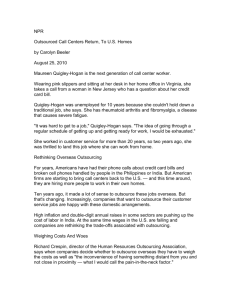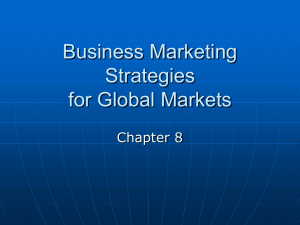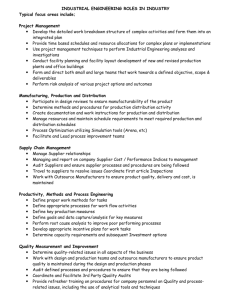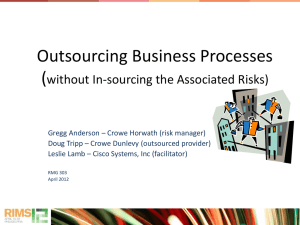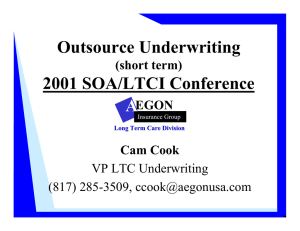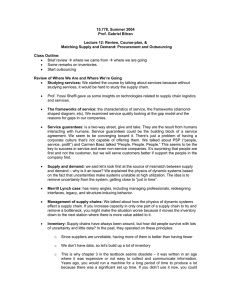15.778, Summer 2004 Prof. Gabriel Bitran
advertisement
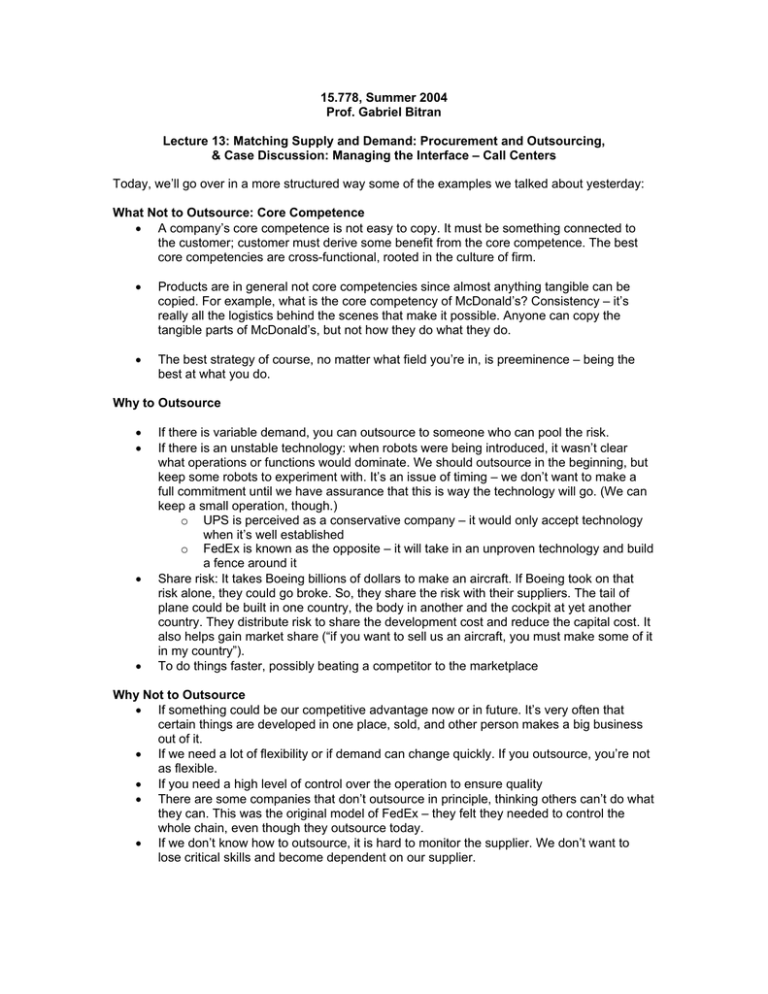
15.778, Summer 2004 Prof. Gabriel Bitran Lecture 13: Matching Supply and Demand: Procurement and Outsourcing, & Case Discussion: Managing the Interface – Call Centers Today, we’ll go over in a more structured way some of the examples we talked about yesterday: What Not to Outsource: Core Competence • A company’s core competence is not easy to copy. It must be something connected to the customer; customer must derive some benefit from the core competence. The best core competencies are cross-functional, rooted in the culture of firm. • Products are in general not core competencies since almost anything tangible can be copied. For example, what is the core competency of McDonald’s? Consistency – it’s really all the logistics behind the scenes that make it possible. Anyone can copy the tangible parts of McDonald’s, but not how they do what they do. • The best strategy of course, no matter what field you’re in, is preeminence – being the best at what you do. Why to Outsource • • • • If there is variable demand, you can outsource to someone who can pool the risk. If there is an unstable technology: when robots were being introduced, it wasn’t clear what operations or functions would dominate. We should outsource in the beginning, but keep some robots to experiment with. It’s an issue of timing – we don’t want to make a full commitment until we have assurance that this is way the technology will go. (We can keep a small operation, though.) o UPS is perceived as a conservative company – it would only accept technology when it’s well established o FedEx is known as the opposite – it will take in an unproven technology and build a fence around it Share risk: It takes Boeing billions of dollars to make an aircraft. If Boeing took on that risk alone, they could go broke. So, they share the risk with their suppliers. The tail of plane could be built in one country, the body in another and the cockpit at yet another country. They distribute risk to share the development cost and reduce the capital cost. It also helps gain market share (“if you want to sell us an aircraft, you must make some of it in my country”). To do things faster, possibly beating a competitor to the marketplace Why Not to Outsource • If something could be our competitive advantage now or in future. It’s very often that certain things are developed in one place, sold, and other person makes a big business out of it. • If we need a lot of flexibility or if demand can change quickly. If you outsource, you’re not as flexible. • If you need a high level of control over the operation to ensure quality • There are some companies that don’t outsource in principle, thinking others can’t do what they can. This was the original model of FedEx – they felt they needed to control the whole chain, even though they outsource today. • If we don’t know how to outsource, it is hard to monitor the supplier. We don’t want to lose critical skills and become dependent on our supplier. If We Outsource, We Need… • The most important thing is the selection of a supplier. A company’s motivation to outsource often leads them to dumping the job on someone quickly. But if you’re planning to outsource seriously, you need a group of people to be experts. They need to be very good at identifying and managing suppliers. If you’re outsourcing something of significance, you need to have leverage over the outsourced company – you need connections at all levels, including at the top to know if the company will be there tomorrow or if they will change their strategy. However, it is hard for a company to do what they do best, if they spend time looking over someone else’s shoulder. This is why sometimes a company keeps a small part of the outsourced operation in house. • You could also outsource expertise at very beginning of the operation so you don’t have to build expertise in house • If it is a critical success factor, you might consider taking a financial stake in that company. Your company doesn’t want to become too dependent on them, and you don’t want the technology they are developing to get in the hands of competitors. My purpose was not to go over reasons why or why not to outsource, since that is covered in other classes, but rather to ask: why are people failing when they outsource? Students’ ideas: • Outsourcing company does not have same motivation as we do. • The customer interaction is moving back one step. • Company might think speed is most important, and sacrifice other attributes • Company might think that something needs to be done, regardless of expense and complexity. • You need all parts of the company to buy into the idea of outsourcing • Prof. Bitran: Here is what I think is really behind what all of you said: it is that we want to deceive ourselves. Since managers know what their true motivation is, after that, they can rationalize everything to themselves. Between the truth and ourselves is our interest. We can rationalize what we want and distort the truth because we are an interested party. This rationalization can even be on a subconscious level. Yesterday’s story was one example: the bank had already committed to retail banking as their salvation and convinced themselves it had to be done, even if it wasn’t going to work. Our interest is so strong sometimes that we don’t even conduct a bare-minimum level of analysis. Class Discussion of the Call Center Case Study For more information, see: Bitran, Gabriel et al. “Call Center Crisis: Inline Communications 2003”
